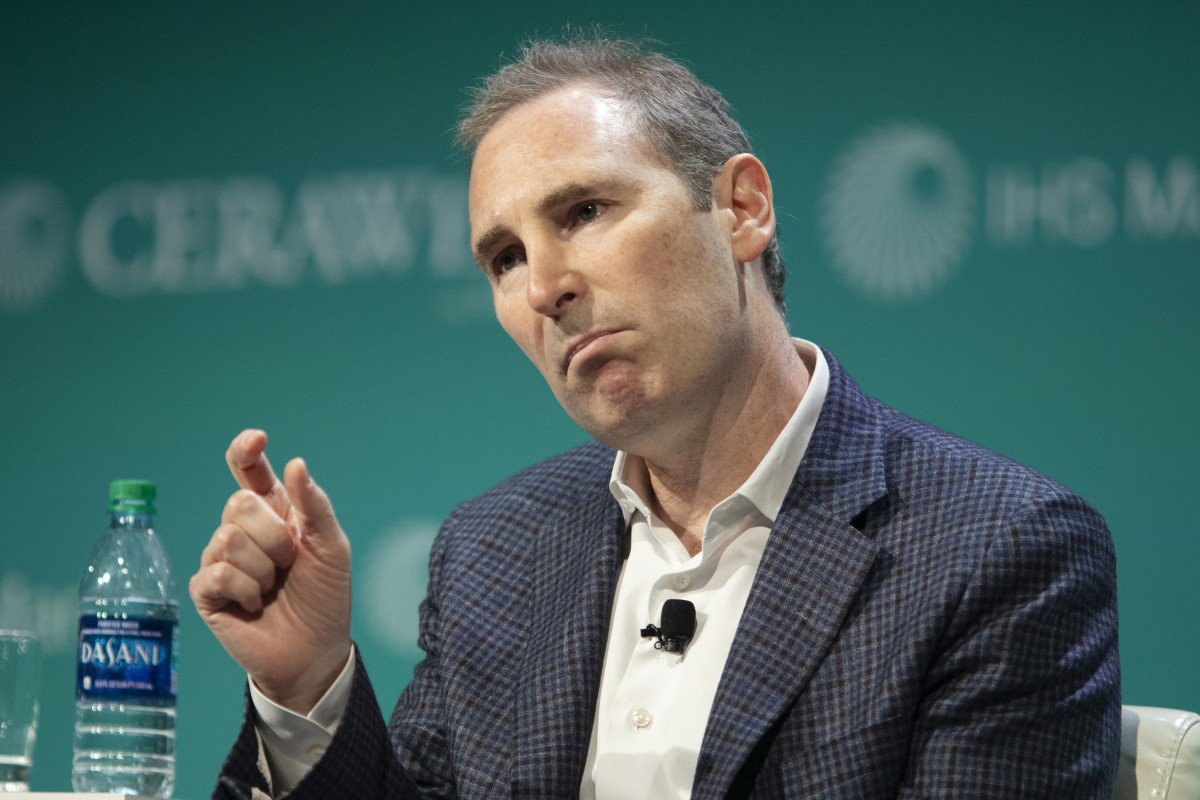In the 1982 science fiction classic “Blade Runner,” Harrison Ford’s character conducts a complicated exam to separate the humans from the androids.
In today’s world, the process might be a little easier, as the humans will be the ones looking for work.
Throughout history, advances in technology have eliminated countless jobs, such as lamplighters, switchboard operators and town criers.
The rise of artificial intelligence might be making our lives easier, but many people in many more industries are worried their livelihoods will go the way of the buggy-whip maker.
More than 7 in 10 Americans are concerned that improvements in AI will spark permanent job losses for a large number of people in the U.S., according to a recent poll.

Bloomberg/Getty Images
The Reuters/Ipsos survey found that 71% of adults said they were worried that AI would put “too many people out of work permanently.”
These concerns were likely made worse by reports that Amazon (AMZN) is planning to replace or avoid hiring as many as 600,000 U.S. workers — roughly the population of Washington, DC — with robots by 2023.
Amazon using AI to eliminate jobs
Amazon is targeting 75% robotic operations to save $12.6 billion in labor costs between 2025 and 2027, Economic Times reported, citing leaked internal documents.
Sources told the news service that 160,000 warehouse roles could be cut in the next two years. The e-commerce and cloud-services giant denied that a mass layoff was planned but confirmed ongoing that continuing investment in automation were reshaping its U.S. workforce.
More Tech Stocks:
- Senior analyst lifts Palantir stock price target with a catch
- Nvidia just scored a massive AI win, but CEO Huang has regrets
- Apple’s iPhone 17 story just took an unexpected turn
- Analysts revamp Salesforce stock forecast after key meeting
Amazon CEO Andy Jassy said in a message to employees in June that the company expected to “reduce our total corporate workforce as we get efficiency gains from using AI extensively across the company.”
AI has also played a role in layoffs at other companies, including Google (GOOGL), IBM (IBM), Accenture (ACN) and the fintech Klarna (KLAR).
Recent studies suggest that fears about robot-related mass layoffs are supported by the facts — at least for now.
A report by the Yale Budget Lab earlier this month found that the broader labor market has not experienced a discernible disruption since OpenAI released ChatGPT in 2022, “undercutting fears that AI automation is currently eroding the demand for cognitive labor across the economy.”
“While this finding may contradict the most alarming headlines, it is not surprising given past precedents,” the report said. “Historically, widespread technological disruption in workplaces tends to occur over decades rather than months or years.”
Computers didn’t become commonplace in offices until nearly a decade after they were made available to the public, the study added, and they took even longer to transform office workflows.
“Even if new AI technologies will go on to impact the labor market as much, or more, dramatically, it is reasonable to expect that widespread effects will take longer than 33 months to materialize,” the Yale report said.
AI job displacement still an open question: report
Similarly, a report by Goldman Sachs released in August said that despite concerns about widespread job losses, “AI adoption is expected to have only a modest and relatively temporary impact on employment levels.”
Goldman Sachs Research estimated that unemployment will increase by 0.5 percentage point during the AI transition period as displaced workers seek new positions.
Related: AI Agents Create Enormous Opportunity — and Risk
“A recent pickup in AI adoption and reports of AI-related layoffs have raised concerns that AI will lead to widespread labor displacement,” Joseph Briggs, who co-leads the Global Economics team in Goldman Sachs Research, and economist Sarah Dong wrote in the report.
“While these trends could broaden as adoption increases, we remain skeptical that AI will lead to large employment reductions over the next decade.”
While executives from the technology and finance sectors say efficiency gains from generative AI have slowed their hiring, especially in operations and back-office capacities, AI adoption remains relatively low, especially among midsize and small enterprises, Goldman said.
“While adoption rates have accelerated recently, the vast majority of companies have not incorporated AI into regular workflows,” the report said.
In the coming years, computer programmers, accountants and auditors, legal and administrative assistants, customer-service representatives, telemarketers, and proofreaders are among those at higher risk of losing their jobs to AI.
Those at the least risk of being displaced include air-traffic controllers, chief executives, radiologists, pharmacists, residential advisers, photographers and members of the clergy.
“Until the AI adoption cycle has fully played out, the potential labor-market disruption —including which jobs are likely to be displaced by generative AI — will remain an open question,” Briggs and Dong wrote.
Related: More police agencies adopt AI, raising efficiency — and concern
#Agents #Create #Enormous #Opportunity #Risk